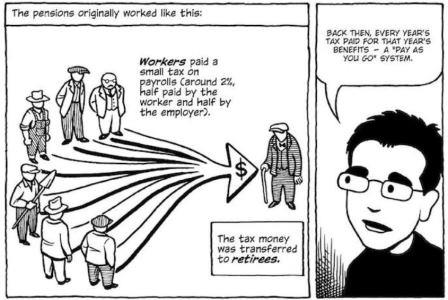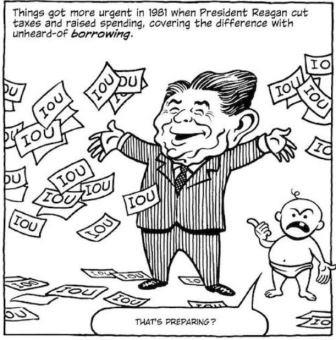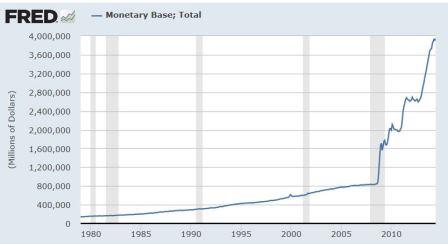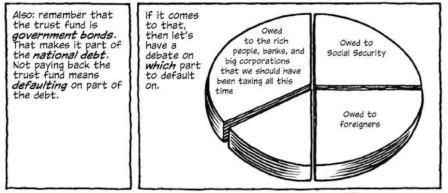Archive for the ‘Pull the Wool over Your Own Eyes’ Category
Thank You for Protecting Me from Myself
Two very helpful persons at the Brookings Institution, Jonathan Rauch and Benjamin Wittes, have written a paper calling for more professionalism and less populism in American public life. The title of the paper claims, “voting makes us stupid.” Really?
Of course, Donald Trump is a walking testament to the stupidity of voters. But their argument goes beyond this. Let’s examine the points in detail.
More Participation Will Not Be Beneficial
The authors go back to, of all people, the Founders as a source of the idea that the Constitution was set up to limit participation. This is true. The Founders feared mob rule almost as much as government tyranny.
Drawing upon ample historical experience, they worried that democracies were vulnerable to demagoguery and prone to instability. Although they insisted that republican government required direct public input, they also constrained and balanced that input.
— Rauch and Wittes
So can we look forward to a shift in the policy of the Brookings Institution to call for a reduction in open primaries and restoration of the selection of Senators to the states?
The People are Incompetent
This is always going to be a seductive idea to a think tank that considers itself a repository of public policy expertise, but leave that aside for now.
This argument actually goes back to Walter Lippmann. In Public Opinion (1922), Lippmann attacked “the doctrine of the omnicompetent citizen.” Lippmann called for a structure modeled on his idea of the British foreign service, where disinterested and independent experts provide policy options to elected officials.
However, there is no such thing as a disinterested expert. The regime Lippmann visualized quickly degenerates into a system where the experts exercise political control because they control the menu of options under discussion.
In practice, the British foreign service wasn’t that great a model. It really worked out like this:
[Bernard] was concerned that the FO [Foreign Office] produces only one considered view, with no options and no alternatives. In practice, this presents no problem. If pressed, the FO looks at the matter again, and comes up with the same view. If the Foreign Secretary demands options, the FO obliges him by presenting three options, two of which will be (on close examination) exactly the same. The third will, of course, be totally unacceptable, like bombing Warsaw or invading France.
— Yes, Prime Minister
That is what is going to happen when unelected experts are in control of the policy menu. Even Lippmann had lost faith in experts by 1925, when he wrote The Phantom Public:
[Government] is also subject to the same corruption as public opinion. For when government attempts to impose the will of its officials, instead of intervening so as to steady adjustments by consent among the parties directly interested, it becomes heavy-handed, stupid, imperious, even predatory.
There is really no such doctrine justifying public participation in politics as based on an “omnicompetent citizen.” The authority of the people is not contingent on them passing some sort of civics test. The legitimacy of the government is derived from the consent of the governed. It is not derived from the consent of that subset of the governed that those governing consider qualified.
We have the right to grant or withhold consent, not because we are omnicompetent, but because we have skin in the game. We live with the consequences of government actions. It’s our blood and treasure on the line.
- In 1953, an Anglo-American effort in Iran instigated the ouster of Prime Minister Mohammed Mossadegh. This was undertaken primarily because Mossadegh wanted to extract more concessions from the British. The participants in the American government believed that the British economy was unable to withstand these concessions. However, the end result included both the breakup of the British monopoly on Iranian oil trade and a price increase to show the Shah was not a puppet of the west. Thus, for all the broken china, this foolish misadventure did not even accomplish its original intention. Did the American people really want what was done in their name?
- In 2016, the Obama administration committed the United States to cut greenhouse gas emissions by 18% under the Paris Agreement. This commitment was made by executive order, bypassing the Constitutional requirement for treaties to be ratified by the Senate. The commitment, which has been revoked by Donald Trump, would have necessarily increased energy costs for American citizens in order to comply with the targets. Why did we want this? The Obama administration knew we did not, which is why it evaded review by our representatives in the Senate.
The People are Irrational
Sure, they are. But the professionals are people, too. How are they not any less irrational than the public at large?
There is a reason that David Halberstam titled his history of the Kennedy and Johnson administrations in Vietnam The Best and the Brightest. The best and the brightest can also go wrong. And when they do, the move in greater unison than the public at large. They largely drink from the same wells of information and have similar outlooks. Groupthink is particularly prevalent among professionals.
The authors quoted Lee Drutman: “Informed, individualistic rationality is a chimera.” Actually, rationality in public life in general is overrated. One of the most rational politicians of the past hundred years was Neville Chamberlain. It is perfectly rational to want to avoid going to war to interfere “in a faraway country between people of whom we know nothing.” But history demonstrated it was a bad idea.
The madman is not the man who has lost his reason. The madman is the man who has lost everything except his reason.
— G. K. Chesterton, Orthodoxy
More Education Will Not Be Helpful
More than what? In 1918, the National Education Association completed Cardinal Principles of Secondary Education. This report called for seven objectives of secondary education, including Civic Education:
For such citizenship the following are essential: A many-sided interest in the welfare of the communities to which one belongs; loyalty to ideals of civic righteousness ; practical knowledge of social agencies and institutions; good judgment as to means and methods that will promote one social end without defeating others; and as putting all these into effect, habits of cordial cooperation in social undertakings.
— Cardinal Principles of Secondary Education, p. 13.
Yet, here we are 99 years later. Every year students are reported to be in greater ignorance of civics, politics and economics than last. Rauch and Wittes cite a survey showing that most respondents cannot name the three branches of government, identify the Chief Justice of the Supreme Court or locate the entity with the power to declare war. Moreover, they cite the common belief that the government spends more on foreign aid than on Social Security or Medicare.
So how is this not an indictment of the existing education establishment? How has the education system delivered on the 1918 goals?
In Public Opinion, Lippmann famously wrote:
It is because they are compelled to act without a reliable picture of the world, that governments, schools, newspapers and churches make such small headway against the more obvious failings of democracy, against violent prejudice, apathy, preference for the curious trivial as against the dull important, and the hunger for sideshows and three legged calves. This is the primary defect of popular government, a defect inherent in its traditions, and all its other defects can, I believe, be traced to this one.
The education system has had a century to remedy the “preference for the curious trivial as against the dull important.” It has not done so, and we can only conclude that it does not want to. Better to keep people in their state of supposed ignorance, and then tell them to leave public policy to the professionals. This is a scam.
It is manifestly unfair to fail to educate people to be effective citizens and then tell them that they can’t participate in political life because they are living in civic ignorance.
The Return of Intermediaries
Rauch and Wittes make the case for intermediaries in public. Political intermediaries can be elected officials or representatives of political parties. What they call a substantive intermediary has specialist knowledge of a policy area, such as health care.
Political intermediaries are necessary. Here is one Rauch and Wittes omitted: states. The several states are a necessary counterweight to federal power. It is more than time to rediscover the role of states in our political process.
The specialist intermediary would be of value. No one without specialist knowledge is going to make sense of the Patient Protection and Affordable Care Act; I tried. It would be great to have intermediaries who could help the citizen navigate the issues.
The first logical candidate might be the media. Try spending a little less time on having two groups of mouthpieces talk over each other, and devote that time to providing information on how a segment of the economy works. If that seems scary, put on segments at 4 in the morning, when no one is watching anyway, and let us record them.
Want to discuss pricing of prescription drugs? Go through the history of the FDA and the decisions that were consciously made to make sure that new drugs were introduced in the US first. Follow the economic consequences of those decisions. Discuss the new drug application (NDA) process that generates enough paper to fill a semi-trailer. Visit ambulancechaser.com (I am not going to give them free publicity by using their real domain name), where people seeking victim status can be gathered into a class to launch a lawsuit.
Corporatism hated intermediaries and sought to get rid of them at every opportunity, leaving the individual citizens alone with the all-knowing, almighty federal government. We need intermediaries that Brookings hasn’t even thought of.
However, we also need to be able to trust the intermediaries. We require that they are giving us all the information, not just a limited and purposeful set of options (two of which are identical and the third totally unacceptable). We need intermediaries to watch the intermediaries.
Yes, the world we live in requires tradeoffs and choices from among the unpalatable and the disastrous. The belief that ordinary people cannot understand these issues in a nuanced way is a piece of received wisdom. Populism is a rebellion against this, an assertion that legitimacy derives from the consent of the people, whether or not the people express themselves in a way pleasing to those who would wield power over them. Thank God the American people have the sand to push back on the professionals who would undermine them.
For What Office Is Hillary Clinton Running?
I watched the acceptance speeches of both candidates at their respective conventions. Hillary Clinton’s speech was not as scary as the speech given by The Ego That Ate Cleveland. Still, there were several disturbing themes in her speech that ought to give us pause.
Clinton’s speech laid out a deeply considered program for a priest-king. I though we were electing a President, a chief executive whose function is to execute the will of Congress. There is a substantial separation between the two.
Michael Wolff, writing in The Hollywood Reporter, summarized the speech this way:
Her speech, proper homework for anyone actually paying attention, proposed that the nation elect her because she was a good person, one without a clear point of view other than an eagerness to help: a do-gooder good at do-gooding.
Wolff is right about the homework, so let’s dig in. All quotes are from Clinton’s speech, as rendered by this link from the Los Angeles Times.
Lauren Manning, who stood here with such grace and power, was gravely injured on 9/11. It was the thought of her, and Debbie St. John, and John Dolan and Joe Sweeney, and all the victims and survivors, that kept me working as hard as I could in the Senate on behalf of 9/11 families, and our first responders who got sick from their time at Ground Zero.
In this campaign, I’ve met so many people who motivate me to keep fighting for change. And, with your help, I will carry all of your voices and stories with me to the White House.
I have been back and forth through Article II of the Constitution, and I just can’t find the part that says that the actions of the President should be informed by the thought of various citizens she personally knows who have encountered hardships. What about the people whose hardships are not known to the President? Shall we have National Appeal Day, during which we all present our pleas for executive relief?
At my first full-time software development job, the VP of Development liked people with whom she had a bond and looked out for them. Just coming in, doing your job quietly and going home was the road to ruin. She used such people like tools. The key was to be a person with real needs to her. She could make that work in a shop of about ten people; it is completely unworkable in a nation of 300+ million. Yet I thought of this model of executive behavior often while listening to Clinton speak.
My primary mission as President will be to create more opportunity and more good jobs with rising wages right here in the United States… From my first day in office to my last! Especially in places that for too long have been left out and left behind.
In my first 100 days, we will work with both parties to pass the biggest investment in new, good-paying jobs since World War II. Jobs in manufacturing, clean energy, technology and innovation, small business, and infrastructure.
Since government is not a wealth-producing entity, what devices would be available to Clinton to create jobs? What are they going to be manufacturing and innovating?
Nevertheless, her ability to spend the money is going to be sharply circumscribed. She still wants affordable health care for everybody. And, to top it off:
If you believe we should expand Social Security and protect a woman’s right to make her own health care decisions… join us.
We’re not just going to protect Social Security; we’re going to expand it. Call and raise! So after all those entitlement sweets are handed out, there won’t be any room for stimulus spending.
Bernie Sanders and I will work together to make college tuition-free for the middle class and debt-free for all! We will also liberate millions of people who already have student debt.
So the people who are never going to go to college and whose kids are never going to go to college are going to pay more for other people’s kids to go to college? Yeah, that will be a hit with the Trumpkins.
Why do we have an education system that fails to prepare kids to be effective economic participants by the time they graduate high school? Can’t much of the undergraduate program, particularly core course materials, be moved up and taught in high school?
Come to think of it, why do we have citizens graduating high school and knowing so little about the Constitution that they don’t understand the roles of the President and Congress? I don’t believe this is what Jefferson had in mind. I am damn sure it is not what John Adams had in mind.
Why do we have kids graduating high school thinking that we can vote ourselves rich?
It’s just not right that Donald Trump can ignore his debts, but students and families can’t refinance theirs.
She has a point there.
And here’s something we don’t say often enough: College is crucial, but a four-year degree should not be the only path to a good job. We’re going to help more people learn a skill or practice a trade and make a good living doing it.
That sounds like a great idea. If she is elected President, what means does she have available to accomplish that?
In the mid-90s, the Chicago Tribune ran a series of articles about families where one of the kids wanted to learn a trade instead of going to college. There was a lot of back-and-forth discussion about the relative merits of going to college vs. learning a trade. However, to me the most important finding of the series was this: Not one family who was interviewed would allow their last names to be used in the article. So whatever came out of people’s mouths about the advantages of going into a skilled trade, it was a sufficient source of shame to the families that they didn’t want their names attached to it.
How would Hillary Clinton cause millions of Americans to reverse their attitudes? What levers would she have available to her to raise the perceived social standing of people in trades up to the level of, say, entry-level white-collar workers? Would she declare them statutorily exempt by executive order, and therefore free from having to punch a clock? If she did, what would happen to overtime for those who are presently qualifying for it?
There are an awful lot of teachers hanging around the Democratic Party. Could Clinton convince them to treat the parents in trades with the same respect as the white-collar, university educated parents? Would she even try?
I will be a President for Democrats, Republicans, and Independents. For the struggling, the striving and the successful. For those who vote for me and those who don’t. For all Americans.
If she really means this — if these are not just high-sounding empty words — here is the place to start: Understand that what you and your friends think of as justice is what many of us find to be injustice.
When I was in school, I had a classmate, Greg, who was really good at math. The only thing he was good at was math — and physics, which is basically applied math. Our Algebra 2 teacher would not give Greg the 99 he earned because, as she explained it, he didn’t work for it. He didn’t have to, and he still earned it. To the teacher, she was acting out of justice, but to us, it was injustice.
The repackaging of Hillary has been going on for some time. Apparently, we are witnessing the release of Hillary Clinton 5.0. All the Clinton loyalists want to assure us that she is sincere, earnest, well-intentioned, caring, and people-centered. Let’s believe them, because there is no risk in doing so. Believing this about her tells us nothing useful as citizens. Earnest, caring, well-intentioned people also go wrong. The road to Hell is paved with good intentions.
Just like in high school: what happens when the well-intentioned teacher who wants to change the world bumps up against people who just don’t see the world the way she does and don’t see the change she wants to implement as a good thing?
[Clinton’s mother] made sure I learned the words of our Methodist faith: “Do all the good you can, for all the people you can, in all the ways you can, as long as ever you can.”
Sounds great: God-fearing, moral and well-intentioned. But when you peel back the surface, you find problems. A woman cannot serve two masters: God and the State. We know the State can use its police power to compel people to do what their leaders believe they should want; this has been a driver for progressives since Herbert Croly. There are a lot of themes here that are troublesome when you peel back the smiling surface layer. The slogan “Stronger together,” for example, is disturbingly reminiscent of “Strength through unity,” a core principle of fascism.
Earnest, caring and well-intentioned are great qualifications for a priest-king. A President is not supposed to need them. A President exists to execute the will of Congress and uphold the Constitution.
And in the end, it comes down to what Donald Trump doesn’t get: that America is great – because America is good.
Does Clinton really believe that America is good? It is impossible to square that with her actions and her statements. At all evidence, America needs Hillary or America won’t do right. Without her earnest, well-intentioned hand on the tiller, the country is just going to sink into a swamp of exploitation, ignorance and injustice.
It is that moral purpose that helps her reconcile cutting any corner, because the end justifies the means. We don’t trust Hillary Clinton because she doesn’t trust us. She thinks she knows better than we what we should want for our country and has to get through this excruciating campaigning process somehow so that she can wield executive power and force her vision down our throats.
Bob Schieffer Gets It Wrong
Today my wife and I were watching Face the Nation. We were doing a lot of hollering at the TV, but that is not unusual anymore. But this moment was in a class by itself.
There was a panel discussion with Peggy Noonan, Bob Schieffer and Ed O’Keefe [transcript]. They were all commenting on the state of the country, when Schieffer said:
People have come to the conclusion that politicians will say and do anything and they don’t see it making much difference. I mean the purpose of government is to improve the lives of our citizens, not to entertain us. And I think many people think that it’s not doing that.
No, that is not the purpose of government. The fact that Schieffer and others believe “the purpose of government is to improve the lives of our citizens” is what got us into the problem we have today. Since the New Deal government has been improving the lives of our citizens. How is that working for you?
The people I have known in sales always tell me:
The definition of insanity is doing the same thing over and over and expecting a different result.
The purpose of government is to lay down the ground rules — the laws — that we live by and enforce them equally for all citizens. It is our responsibility to improve our own lives. You are the only person who can improve your own life, because you are the expert in your own life and what improvement would actually look like.
As long as we have people looking to government to improve their lives, we are going to be stuck in this mess.
As not what your country can do for you; ask what you can do for yourself.
Who Gets the Handouts?
In the 1930s, we experienced an economic depression like nothing we had ever experienced before. As a result, Americans demanded an activist government that helped people — but not all people. The New Deal helped white industrial workers and farmers more than it did blacks and Mexican-Americans. In real estate, the New Deal reinforced segregation and introduced redlining.
There is general consensus that the elections of the 1930s realigned the electorate, introducing what is called the Fifth Party System. Here are the election results for 1936:

1936 Presidential Election results. From Dave Leip’s Atlas of U.S. Presidential Elections (http://uselectionatlas.org/RESULTS/).
There was a broad base of support for FDR, which is why he won four elections. The people who were advocating a reduced role of government were selling a product the majority of the electorate did not want.
In the 1960s, the Democratic Party shifted focus. It began advocating a more inclusive approach to government benefits. The largely white principal beneficiaries of the New Deal saw this and they didn’t like it, like it, no they did not. What did they do about it?

1968 Presidential Election results. From Dave Leip’s Atlas of U.S. Presidential Elections (http://uselectionatlas.org/RESULTS/).
This shows the Southern Strategy wasn’t that effective: four southern states broke for Wallace, while Texas remained loyal to the Democrats. But the historical base of the New Deal coalition was alienated. In 1980, many defected to Reagan.

2008 Presidential Election results. From Dave Leip’s Atlas of U.S. Presidential Elections (http://uselectionatlas.org/RESULTS/).
2008 is a picture of the Democratic coalition at about its strongest without an incumbent to support. Let’s take that result and back it off a bit (otherwise the Democrats would be winning all the elections, which is counterfactual) to find the base strength of the support for an inclusive program of aggressive government benefits.
The role of government is the key issue of our time. Everything else that is important flows from this. Laying 2008 over 1936, and attempting to adjust for changes in demographics over 80 years, this is what I get:
What can we learn?
- There has been no realignment since the 1930s. The majority of the electorate still expects big government and benefits therefrom. The big fight is over who gets their promises kept and who has to go without.
- In order to hold the line against dilution of their benefits, the favored groups of the New Deal — who I am calling the “White Big Government” group — often team up with the small government conservatives to block the extension of benefits to others, notably blacks and Hispanics, which threatens to dilute the benefits to which the former believe themselves entitled.
- In a straight-up referendum in the current electoral climate, the big government side would trounce the small government side. Conservatives who believe otherwise are delusional.
What has happened this year in the Republican Party is really a hostile takeover. It is as if the Reagan Democrats had come over to the Republican Party in 1980 and nominated Jacob Javits (not that there is any comparison in terms of integrity or behavior between Sen. Javits and Donald Trump). But then,
All the noise about Donald Trump’s “hostile takeover” of the Republican Party misses a key point: Such takeovers only succeed when existing management has failed massively.
— “How the Republican Party Earned a Hostile Takeover”, New York Post (http://nypost.com/2016/03/02/how-the-republican-party-earned-a-hostile-takeover/)
The Trumpkins want to take the Republican Party away from the conservatives and the establishment pols who never deliver what the former consider really important. They feel abandoned by the Democrats, and are happy to return the favor. Why did 20,000 voters in Massachusetts stop being Democrats? It’s not a massive plot to undermine the Republican Party and elect Hillary Clinton. It is a hostile takeover. We’re going over here to get the candidate we want.
The Trumpkins are fed up with the standard shuck-and-jive, where candidates blow sweet nothings in their ears, then blow their interests off once elected. They don’t want a reduced role of government. They have enough common sense to realize that there is not enough wealth to keep all the promises that have been made by successive elected officials, and they don’t want to be the ones getting the shaft. Chasing after government handouts is at best a zero-sum game. In order for me to win, you have to lose. That is what all the anger is really about. All the rest is window dressing to them, and they are prepared to ignore it.
If you think this is ugly, we haven’t even got to the difficult part. Wait until the rest of the electorate cottons on to the fact that the entitlement cupboard is bare.
No, It Hasn’t Peaked Quite Yet
Jon Lovett was a speechwriter for President Obama for three years. He left Washington to write for the unsuccessful TV series “1600 Penn.” Last week, he delivered the Commencement Address at Pitzer College in Claremont, CA. An excerpt from that speech was published in The Atlantic: http://www.theatlantic.com/politics/archive/2013/05/life-lessons-in-fighting-the-culture-of-bullshit/276030/
I believe we may have reached “peak bullshit.” And that increasingly, those who push back against the noise and nonsense; those who refuse to accept the untruths of politics and commerce and entertainment and government will be rewarded. That we are at the beginning of something important.
I, however, think Churchill is more apropos:
Now this is not the end. It is not even the beginning of the end. But it is, perhaps, the end of the beginning.
We have not hit the peak yet. We are not yet at the beginning of something important, but we are reaching the end of something very trivial, very fake, very self-referential.
The business of bullshit, like that of illegal drugs, is demand-driven: as long as there is demand, someone will supply it, because, for some people, supplying bullshit beats working. Thus, in order to estimate when we are over the peak, we have to watch for signs of a fall-off in demand. People have to stop participating in the transaction, rewarding others for bullshitting them.
In any prosperous society, people prefer to avoid accountability and whisper sweet nothings in their own ears. They prefer the view in the mirror to the view out the window until the latter is too menacing to be ignored. Therefore, the prosperity has to go away to the point that people start paying attention to what is outside the window again. Conditions have to get sufficiently scary and compelling. How far a society has to fall depends on the society. Some never get their faces out of the mirror until they hit the pavement and go splat.
I would like to think we can clue in before we fall that far. What would be some signs that we had crossed over the peak and are on the downslope?
One indication would be the existence of fewer speechwriters. One questions whether the politicians really believe half of what is written for them.
Time Allocation
A necessary precondition is for ordinary people to be paying attention. Both the Tea Party and Occupy Wall Street are early, faltering, blind beginnings. We need more people paying attention, allocating their time to being subjects rather than objects in their economic and political lives.
Where would the time come from to allocate to this? It would have to come from leisure, because there is no where else to obtain it. Therefore, one set of indicators would be consequences of people allocating their time away from leisure. This would manifest itself as dislocations in the entertainment business, as there would be a sudden glut of entertainment relative to demand. Positive signs in this area would be:
- Contraction in major sports, such as the National Football League (In the National Hockey League, there is already one franchise known to be on life support).
- A periodical such as People or Us ceasing publications.
I don’t have anything against entertainment. I watch pro sports myself. However, if people allocate their time away from leisure and toward investing in themselves and their communities, there just isn’t going to be enough leisure to go around and support all the entertainment channels that currently exist.
Controls
A common cause of being lied to is failure, as a process owner, to establish adequate controls. Whether you are a parent, a manager or a citizen, how do you know what is being done when your back is turned? You create controls to allow you to know, and to allow the people subject to the controls to know that you know.
Locks keep honest people honest.
— Computer security proverb
A good leading indicator would be the sight of parents establishing and enforcing adequate controls for their kids.
It would also help if more people took a greater interest in what their elected officials are doing. Transparency doesn’t help if no one is looking. It would be great to hear that the server at http://thomas.loc.gov/home/thomas.php was overwhelmed by demand of voters to find out what their elected officials were creating and what their voting records were.
Overcoming Sentimentality
“It is work,” as Buddha says, and not love, as the Western sentimentalist would have it, “that makes the world go round.”
— Irving Babbitt, Democracy and Leadership, p. 247.
If we are to get control over the conning and lying, we must stop setting ourselves up to be conned and lied to. The sentimentalist, being naturally expansive, wants to open all doors and hope for the best. He thrills to words and phrases that sound pleasing, without thinking through what they really mean. Then, when the nasty surprise comes at the end, he is blindsided. How could anyone have known?
Avoiding the outcome we are experiencing requires a lot of work. It requires thinking through the consequences fearlessly, peering down the road before turning down it. It requires taking responsibility for more of our own lives. It requires cleaning up our little corners of the world ourselves, so the great campaigns and crusades are unnecessary.
A population that was less sentimental would not necessarily be hard, cold or merciless. It need not result in uncharitable behavior. But the charity would be deliberately granted or withheld.
More to the point, as a less sentimental people, we would be more demanding on ourselves. We would set more limits and exercise more restraint. We would do the work to understand the consequences of what we were doing before we did it. Behaviors that exemplify these qualities would be powerful indicators that we, as a people, were ready to be done with the lies and the cons.
Lovett praises the earnestness and authenticity of the graduates. Earnestness and authenticity are not enough. Any medieval mob that roved the land, pillaging towns and killing people, was earnest and authentic. So were the followers of Soviet Communism in the 1920s and 1930s, until they were in their turn liquidated by Stalin, often with the assistance of other earnest and authentic followers.
We need more than this. We need skepticism without cynicism, although what we have is quite the other way around. We need to be equipped and ready to do the inner work to make ourselves proof against the untruths. We need the intellect to know what to do and the will to do it.






